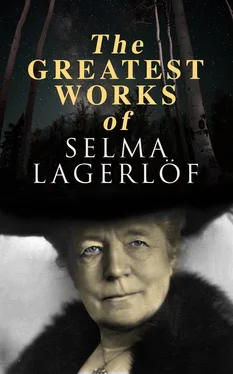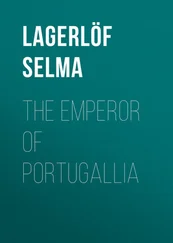"I wonder how long it takes for the logs to get to the mill?" said the boy.
The eagle continued his slow flight down River Ljungen. Over many places he paused in the air on outspread wings, that the boy might see how this kind of harvest work was done.
Presently they came to a place where the loggers were at work. The eagle marked that the boy wondered what they were doing.
"They are the ones who take care of all the belated harvest," the eagle said.
The boy remembered the perfect ease with which his people at home had driven their grain to the mill. Here the men ran alongside the shores with long boat-hooks, and with toil and effort urged the logs along. They waded out in the river and were soaked from top to toe. They jumped from stone to stone far out into the rapids, and they tramped on the rolling log heaps as calmly as though they were on flat ground. They were daring and resolute men.
"As I watch this, I'm reminded of the iron-moulders in the mining districts, who juggle with fire as if it were perfectly harmless," remarked the boy. "These loggers play with water as if they were its masters. They seem to have subjugated it so that it dare not harm them."
Gradually they neared the mouth of the river, and Bothnia Bay was beyond them. Gorgo flew no farther straight ahead, but went northward along the coast. Before they had travelled very far they saw a lumber camp as large as a small city. While the eagle circled back and forth above it, he heard the boy remark that this place looked interesting.
"Here you have the great lumber camp called Svartvik," the eagle said.
The boy thought of the mill at home, which stood peacefully embedded in foliage, and moved its wings very slowly. This mill, where they grind the forest harvest, stood on the water.
The mill pond was crowded with logs. One by one the helpers seized them with their cant-hooks, crowded them into the chutes and hurried them along to the whirling saws. What happened to the logs inside, the boy could not see, but he heard loud buzzing and roaring, and from the other end of the house small cars ran out, loaded with white planks. The cars ran on shining tracks down to the lumber yard, where the planks were piled in rows, forming streets—like blocks of houses in a city. In one place they were building new piles; in another they were pulling down old ones. These were carried aboard two large vessels which lay waiting for cargo. The place was alive with workmen, and in the woods, back of the yard, they had their homes.
"They'll soon manage to saw up all the forests in Medelpad the way they work here," said the boy.
The eagle moved his wings just a little, and carried the boy above another large camp, very much like the first, with the mill, yard, wharf, and the homes of the workmen.
"This is called Kukikenborg," the eagle said.
He flapped his wings slowly, flew past two big lumber camps, and approached a large city. When the eagle heard the boy ask the name of it, he cried; "This is Sundsvall, the manor of the lumber districts."
The boy remembered the cities of Skåne, which looked so old and gray and solemn; while here in the bleak North the city of Sundsvall faced a beautiful bay, and looked young and happy and beaming. There was something odd about the city when one saw it from above, for in the middle stood a cluster of tall stone structures which looked so imposing that their match was hardly to be found in Stockholm. Around the stone buildings there was a large open space, then came a wreath of frame houses which looked pretty and cosy in their little gardens; but they seemed to be conscious of the fact that they were very much poorer than the stone houses, and dared not venture into their neighbourhood.
"This must be both a wealthy and powerful city," remarked the boy. "Can it be possible that the poor forest soil is the source of all this?"
The eagle flapped his wings again, and went over to Aln Island, which lies opposite Sundsvall. The boy was greatly surprised to see all the sawmills that decked the shores. On Aln Island they stood, one next another, and on the mainland opposite were mill upon mill, lumber yard upon lumber yard. He counted forty, at least, but believed there were many more.
"How wonderful it all looks from up here!" he marvelled. "So much life and activity I have not seen in any place save this on the whole trip. It is a great country that we have! Wherever I go, there is always something new for people to live upon."
A MORNING IN ÅNGERMANLAND
Table of Contents
THE BREAD
THE FOREST FIRE
Table of Contents
Saturday, June eighteenth .
Next morning, when the eagle had flown some distance into Ångermanland, he remarked that to-day he was the one who was hungry, and must find something to eat! He set the boy down in an enormous pine on a high mountain ridge, and away he flew.
The boy found a comfortable seat in a cleft branch from which he could look down over Ångermanland. It was a glorious morning! The sunshine gilded the treetops; a soft breeze played in the pine needles; the sweetest fragrance was wafted through the forest; a beautiful landscape spread before him; and the boy himself was happy and care-free. He felt that no one could be better off.
He had a perfect outlook in every direction. The country west of him was all peaks and table-land, and the farther away they were, the higher and wilder they looked. To the east there were also many peaks, but these sank lower and lower toward the sea, where the land became perfectly flat. Everywhere he saw shining rivers and brooks which were having a troublesome journey with rapids and falls so long as they ran between mountains, but spread out clear and broad as they neared the shore of the coast. Bothnia Bay was dotted with islands and notched with points, but farther out was open, blue water, like a summer sky.
When the boy had had enough of the landscape he unloosed his knapsack, took out a morsel of fine white bread, and began to eat.
"I don't think I've ever tasted such good bread," said he. "And how much I have left! There's enough to last me for a couple of days." As he munched he thought of how he had come by the bread.
"It must be because I got it in such a nice way that it tastes so good to me," he said.
The golden eagle had left Medelpad the evening before. He had hardly crossed the border into Ångermanland when the boy caught a glimpse of a fertile valley and a river, which surpassed anything of the kind he had seen before.
As the boy glanced down at the rich valley, he complained of feeling hungry. He had had no food for two whole days, he said, and now he was famished. Gorgo did not wish to have it said that the boy had fared worse in his company than when he travelled with the wild geese, so he slackened his speed.
"Why haven't you spoken of this before?" he asked. "You shall have all the food you want. There's no need of your starving when you have an eagle for a travelling companion."
Just then the eagle sighted a farmer who was sowing a field near the river strand. The man carried the seeds in a basket suspended from his neck, and each time that it was emptied he refilled it from a seed sack which stood at the end of the furrow. The eagle reasoned it out that the sack must be filled with the best food that the boy could wish for, so he darted toward it. But before the bird could get there a terrible clamour arose about him. Sparrows, crows, and swallows came rushing up with wild shrieks, thinking that the eagle meant to swoop down upon some bird.
"Away, away, robber! Away, away, bird-killer!" they cried. They made such a racket that it attracted the farmer, who came running, so that Gorgo had to flee, and the boy got no seed.
Читать дальше












